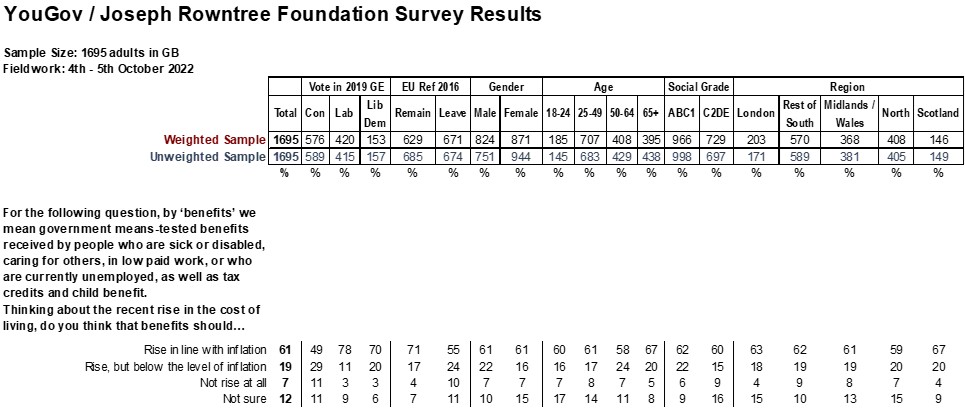- The majority (61%) of the public agrees that benefits should
go up in line with inflation, in first polling carried out on the
issue.
- New analysis shows that the average working age couple on
benefits with two children will lose over £300 per year from
their incomes as of next April – when many are already unable to
afford essentials.
Polling by YouGov for the Joseph Rowntree Foundation this week
found that 61% of the public agreed that benefits should go up in
line with inflation, including half (49%) of 2019 Conservative
voters. Just one in five (19%) instead believe there should be a
rise below inflation, as has been proposed by the Government,
with only 7% believing there shouldn’t be a rise at all.
This represents a firm majority on an issue which has only been
in the public eye for just over a week, and reflects a longer
term trend around views on social security and the need for the
system to provide people with enough to live on.
The suggested increase of 5.4%, in line with earnings, would
amount to the biggest permanent real-terms cut to the basic rate
of benefits ever made in a single year, according to JRF analysis
released last week.
These benefits are those received by people who are too sick and
disabled to work, those looking for work and those working but on
low earnings, as well as those receiving child benefit.
Only a quarter of the public do not think that benefits should
rise with inflation – sending a clear message to the government
that there is support to make sure the lowest incomes keep up
with prices.
Just 19% said they should go up below inflation and 7% said they
shouldn’t go up at all, making 26% who were against an inflation
rise. The majority in favour of fully uprating in line with
inflation is clear across all regions, age groups and income
groups, with 67% of the over 65s in favour.
The poll was of 1695 people
across the UK and was carried out during the Conservative Party
conference on Tuesday and Wednesday of this week (4/5 October).
At the same time, JRF’s latest analysis of the impact of the
proposed real-terms cut shows that the average working age couple
with two children receiving benefits will lose over £300 per year
from their incomes after housing costs as of next April – at a
time when we know many are already struggling to afford the
essentials.
|
|
2023/24 Average net disposable income after housing costs
|
|
Working-age household on benefits
|
with benefits uprated by inflation (10%)
|
with benefits uprated by earnings (5.4%)
|
Average loss £/y
|
|
Lone parent 1 child
|
16,129
|
15,775
|
-
354
|
|
Couple 2 children
|
34,031
|
33,719
|
-
312
|
|
Single no children
|
9,361
|
9,175
|
-
186
|
|
Couple no children
|
17,920
|
17,604
|
-
316
|
Rebecca McDonald, Chief Economist at the Joseph Rowntree
Foundation said:
“The majority of the public have taken a clear view already, and
firmly oppose government suggestions that they are considering
the biggest permanent real-terms cut to the basic rate of
benefits ever made in a single year. This is all the more
decisive when you consider that the issue has only been in the
public eye since the government first floated the idea for the
real-terms cut less than a fortnight ago.
“The majority in favour of uprating in line with inflation, as
promised by then-Chancellor earlier in the year, runs
across all age groups, income groups and regions. The Prime
Minister must surely realise that her refusal to confirm the
uplift is completely out of step with public opinion and the
times in which we are living.
“Pressing ahead with this move in the face of public opposition
would be morally indefensible and would target spending cuts at
those on the lowest incomes, many of whom cannot afford the
essentials as it is. It would also terrify millions who have
already been enduring a cost of living emergency for months.”
ENDS
Notes to Editors
Full polling results:

- The poll was of 1695 people across the UK and was carried out
online by YouGov during the Conservative Party conference on
Tuesday and Wednesday of this week (4/5 October).
- All figures, unless otherwise stated, are from YouGov
Plc. Total sample size was 1,695 adults. Fieldwork was
undertaken between 4th and 5th of October 2022. The survey
was carried out online. The figures have been weighted and are
representative of all GB adults (aged 18+).
